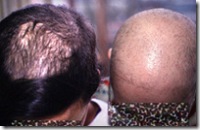Trichotillomania
 Trichotillomania, also known as “tritch”, is a psychological condition that involves a compulsion to pluck or pull out one’s hair on a repetitive basis. It often runs in families, is known to be triggered by stress, and afflicts women (65% of all cases) more often than men.
Trichotillomania, also known as “tritch”, is a psychological condition that involves a compulsion to pluck or pull out one’s hair on a repetitive basis. It often runs in families, is known to be triggered by stress, and afflicts women (65% of all cases) more often than men.
The disease was first discovered and described in 1889 by French doctor, Francois Hallopeau. In trichotillomania, the urge to pull out scalp hair is so overwhelming that affected people cannot resist it. Some varieties of “tritch” also involve pulling of eyelashes, eyebrows, and nose, facial and pubic hair. In very rare cases, patients are also prone to eating the roots of the hair they have plucked (trichophagia). In severe cases, patients may become almost completely bald (See Picture 1: Mother and daughter at different stages of trichotillomania). Patients with trichotillomania often suffer from low self-esteem, associated with the fear of socializing, and tend to wear wigs or hats to mask bald spots.
Diagnosing trichotillomania can be difficult and may require taking a biopsy of the scalp, especially since a patient is often unwilling to admit the condition or even to talk about it. A clue that can indicate and help identify the disease is unusual twisting and fracturing of the distal shaft of hair, which can be revealed during visual examination. Various studies have linked “tritch” to a number of other conditions, such as a decreased cerebellar volume, a reduced ability to secrete serotonin, and a higher incidence of depression, kleptomania, body dysmorphic disorder, and Tourette’s syndrome.
In the majority of mild cases, trichotillomania tends to resolve spontaneously. However, the disease is chronic in nature and is considered incurable by medical means. If trichotillomania manifests in association with a background of clinical depression, schizophrenia, obsessive-compulsive or anxiety disorders, or other severe mental illnesses, the treatment of the basic disease usually is effective against trichotillomania, as well. Clomipramine and selective serotonin reuptake inhibitors are some useful pharmaceutical drugs that help manage this condition. A successful addition to pharmacotherapy is Habit Reversal Training developed by Dr. Prasandy Azrin in 1973 and is still used today. Russian psychoanalyst, Dr. Levi, who successfully works with trichotillomania cases, suggests that patients should try to use a furry animal skin instead of their own skull to pluck hair from.
Robin Makris
—————————–
Unlike previously approved treatments for impotence, Viagra Professional does not directly cause penis erection, but affects the response to sexual stimulation.
Posted on September 27, 2007
Filed Under Hair Loss Conditions
Comments
Leave a Reply
